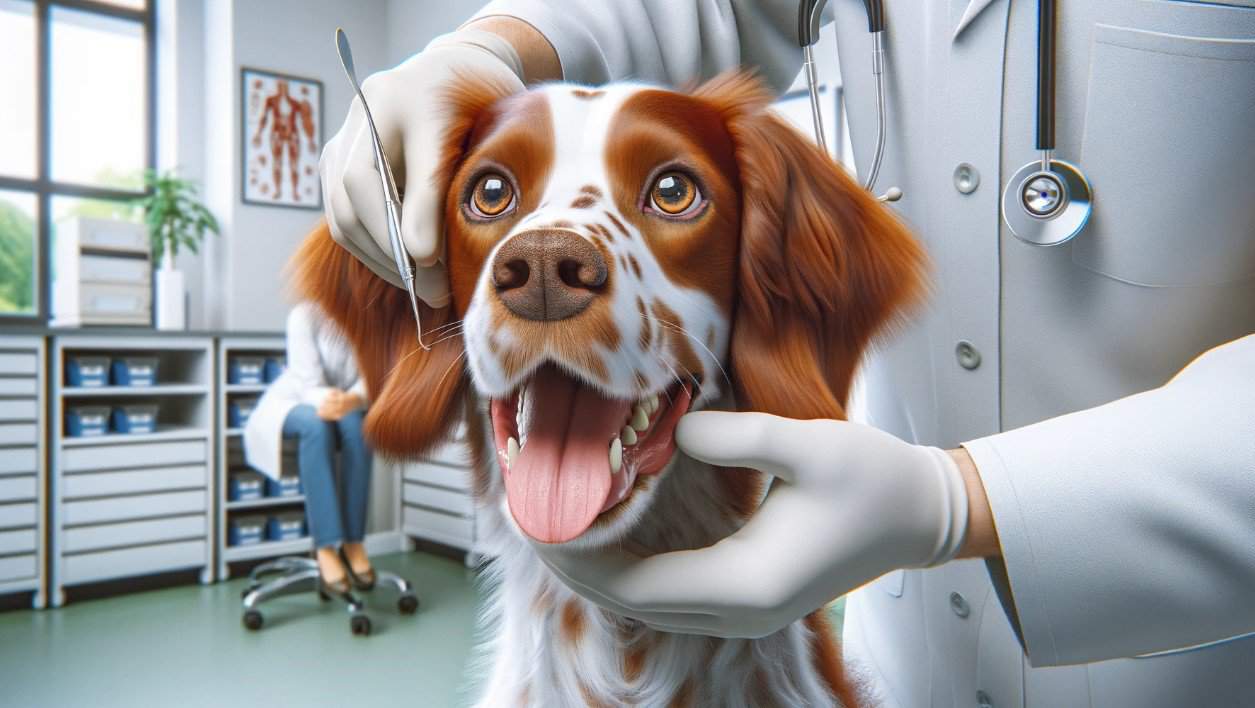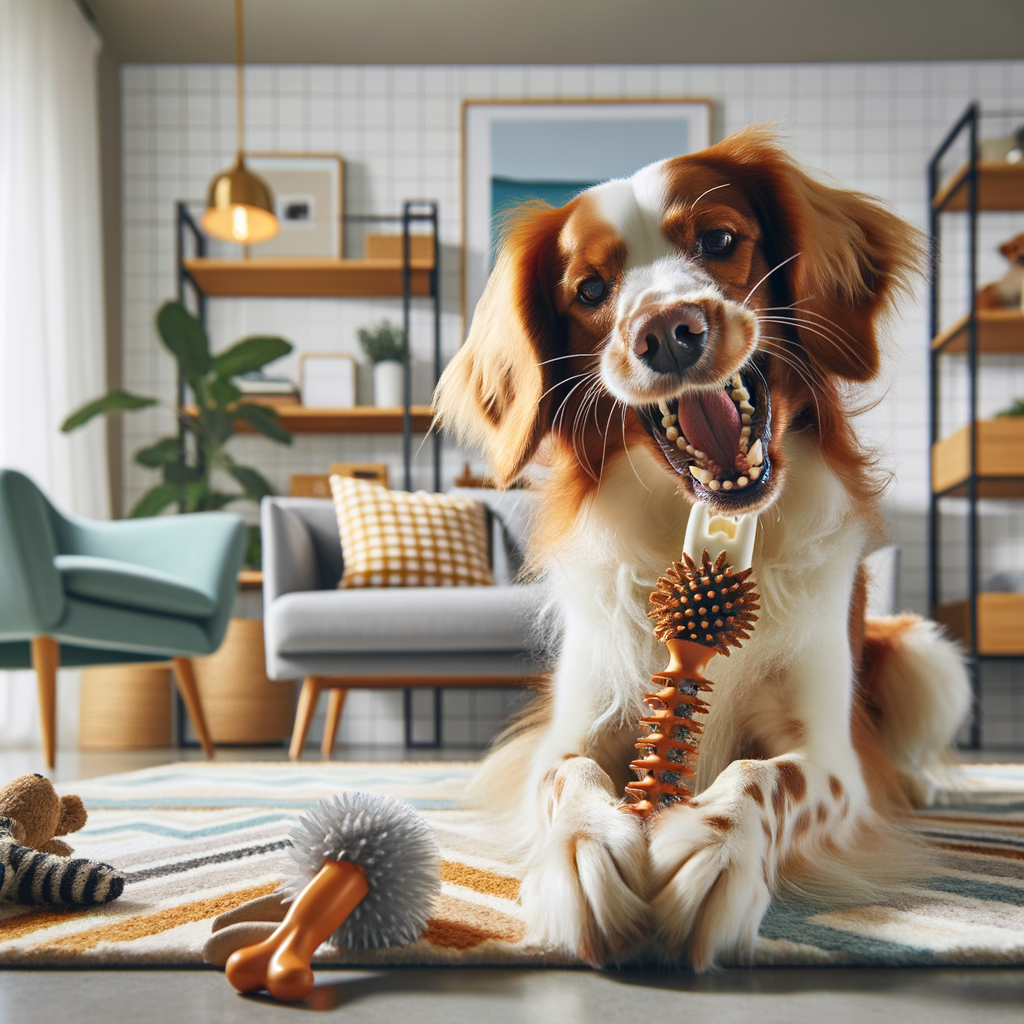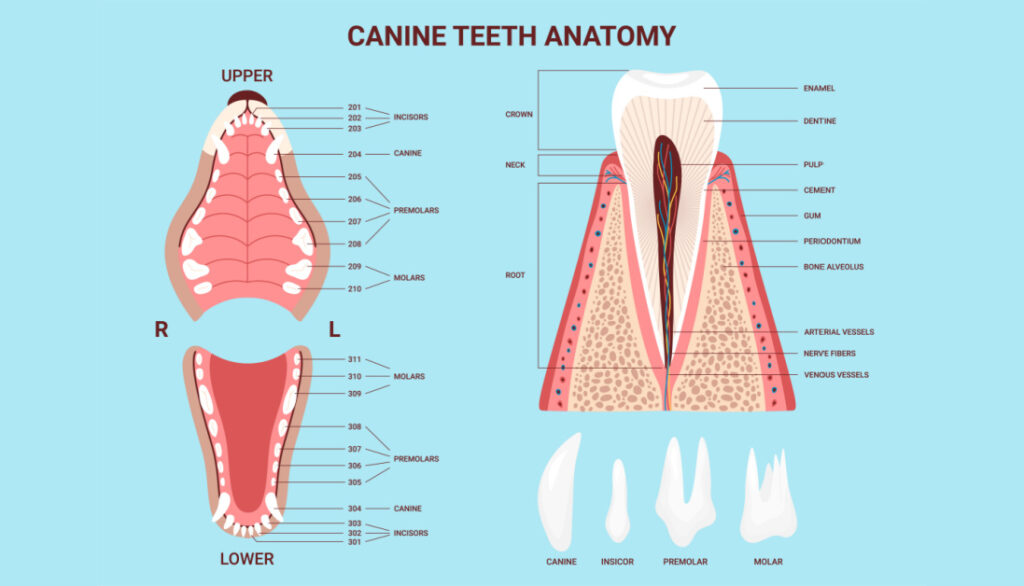Hi there, fellow dog parent! I’m Dr. Candy, your go-to holistic veterinarian. Today, let’s talk about something that’s often overlooked but is crucial to your dog’s overall health – Brittany Dental Health. Did you know that dental disease is not just about bad breath or yellow teeth? It can lead to serious health issues like heart disease and kidney problems if left untreated.

If you’re a parent to a Brittany, you should be aware that this breed is particularly susceptible to dental health issues. But don’t worry, I’m here to guide you through the signs of dental disease, common dental health problems in Brittany Spaniels, and the conventional treatments available. I’ll also share my holistic approach to maintaining your Brittany’s dental health, which includes diet recommendations and specific probiotics. Lastly, I’ll recommend some dental chews and products that are actually effective, unlike some of the commercially promoted ones. So, let’s get started on ensuring your Brittany has a healthy and happy smile!
Signs of Dental Disease in Brittany
Understanding the signs of dental disease in your Brittany is crucial to ensure your fur baby’s overall health and well-being. Poor dental health can lead to severe issues, including heart, liver, and kidney disease. It’s not just about sparkling teeth; it’s about a healthy life for your pet.
As a holistic veterinarian, I often get asked about the signs of dental disease in Brittanys. These dogs are known for their lively and energetic nature, but they are also predisposed to certain dental health issues. So, let’s dive into the signs to watch out for.
- Bad breath: While it’s common for dogs to have a particular ‘doggy breath,’ excessively foul-smelling breath can be a sign of oral disease.
- Difficulty eating: If your Brittany is showing reluctance in eating or chewing, or if they’re eating slowly, it could indicate dental pain.
- Red or swollen gums: Healthy gums should be pink, not red or swollen. If you notice any changes in your dog’s gums, it’s a clear sign of dental issues.
- Yellow or brown teeth: Discolored teeth are often the result of tartar build-up, which can lead to gum disease if not addressed promptly.
- Loose or missing teeth: This is a severe sign of dental disease in Brittanys. If you notice any loose or missing teeth, it’s time to visit your vet immediately.
Remember, prevention is always better than cure. Regular dental check-ups can help catch issues before they become severe. Incorporating dental care into your Brittany Spaniel’s routine is a critical part of their overall health plan. And if you notice any of these signs, don’t wait. Prompt veterinary attention can prevent further complications and keep your Brittany’s tail wagging for years to come.
Through my holistic approach to Brittany dental health, I’ll guide you on how to maintain your pup’s pearly whites, from diet modifications to natural dental chews, and more. But first, understanding these signs of dental disease is the first step towards a healthier, happier Brittany.

Common Dental Health Issues In Brittany
As a veterinarian, I’ve observed that Brittany Dental Health issues are quite common in this breed. Let’s discuss some of the most prevalent dental problems we usually see in Brittanys:
- Periodontal Disease: This is the most common dental issue in Brittanys. It starts with plaque buildup, which hardens into tartar over time. If not treated, it can lead to gum inflammation, tooth loss, and even systemic infections.
- Broken Teeth: Brittanys, known for their active nature, are prone to breaking their teeth while playing or chewing hard objects. Broken teeth can cause pain and lead to infections if left untreated.
- Oral Tumors: While not as common as the other two, oral tumors are a serious Brittany Dental Health concern. They can be benign or malignant, and early detection is crucial for successful treatment.
It’s essential to know that these issues are largely preventable. Regular dental check-ups, good oral hygiene, and a balanced diet can significantly improve your Brittany’s dental health. Remember, prevention is always better than cure. So, don’t wait for signs of dental disease before you start caring for your Brittany’s teeth.
Brittany Spaniel dogs, with their lively and energetic nature, require routine dental health check-ups to ensure they maintain a healthy mouth. There are a few conventional dental health treatments that can help keep your Brittany’s dental health in check. Let’s explore these options.
Anesthetic Dental Cleanings
One of the most common and effective ways to maintain your Brittany’s dental health is through anesthetic dental cleanings. This method involves putting your pet under general anesthesia and performing a thorough cleaning of their teeth and gums. This procedure is highly effective in removing plaque and tartar, which are the leading causes of periodontal disease. However, it’s essential to understand that this treatment should be performed by a professional veterinarian to ensure safety.

Potential Individual Health Obstacles
While anesthetic dental cleanings are generally safe, there are certain health obstacles that may pose risks. Brittany Spaniel dogs with heart problems may not tolerate anesthesia well, making dental cleaning procedures potentially dangerous. Similarly, some dogs may have drug sensitivities, leading to adverse reactions to the anesthesia drugs used in the procedure.
Brittany dogs that experience seizures may also face increased risks during anesthetic dental cleanings. The stress and anxiety associated with the procedure could potentially trigger a seizure episode. Therefore, it’s crucial to discuss these health concerns with your vet before opting for anesthetic dental cleaning.
Lastly, extreme age can pose a significant health obstacle. Older dogs may not handle anesthesia as well as younger dogs. They also may have underlying health conditions that could complicate the procedure. Therefore, it’s essential to consult with your vet to determine the best dental health treatment for your elderly Brittany.
Remember, maintaining your Brittany’s dental health is not just about preventing bad breath. It’s also about ensuring their overall health and happiness. Regular check-ups and appropriate dental treatments can go a long way in keeping your Brittany’s smile bright and healthy!
When it comes to Brittany Dental Health, a holistic approach can be highly effective. One such approach is Dr. Candy’s method, which focuses on diet and oral health-specific probiotics. Let’s delve into this approach and see how it can improve your Brittany’s dental health.
Diet- Low Carbs, Avoid Added Sugars, Enzymes In Fresh Food
First off, diet plays a significant role in your Brittany’s dental health. A diet low in carbs is recommended as carbohydrates can lead to plaque buildup, which can result in dental diseases. Avoiding added sugars is also crucial. Sugars can create a breeding ground for harmful bacteria in your dog’s mouth, leading to tooth decay and gum disease.
- Low-carb foods: Opt for foods like lean meats, vegetables, and high-quality dog food that is low in carbohydrates.
- Avoid added sugars: Be sure to check the labels of your dog’s food and treats. Avoid products with added sugars.
- Enzymes in fresh food: Fresh foods, especially raw or lightly cooked meats and vegetables, contain natural enzymes that can help clean your dog’s teeth and promote good oral health.
Oral Health Specific Probiotics
Another part of Dr. Candy’s holistic approach to Brittany Dental Health is the use of oral health-specific probiotics. Probiotics are beneficial bacteria that can help balance the microbiome in your dog’s mouth, preventing the overgrowth of harmful bacteria that can lead to dental diseases.
One such probiotic is Probiora for Dogs, an oral health-targeted probiotic. This product is designed to support your dog’s oral health, helping to keep their teeth and gums healthy. It’s easy to use – simply sprinkle it on your dog’s food once a day.
Remember, a holistic approach to Brittany Dental Health is about more than just brushing your dog’s teeth. It’s about taking care of their entire oral ecosystem, from their diet to the bacteria in their mouth. By following Dr. Candy’s approach, you can help ensure your Brittany Spaniel has a healthy mouth and a happy life.
When it comes to maintaining your Brittany’s dental health, one of the most common pieces of advice you’ll hear is to give them dental chews. But not all dental chews are created equal. In fact, many commercially promoted dental chews may not be as effective as they claim to be. Some may even contain harmful ingredients that could compromise your furry friend’s overall health.

The Failure of Commercially Promoted Dental Chews
Commercially promoted dental chews often contain artificial colors, flavors, and preservatives which could potentially harm your dog. These products often promise to help with plaque and tartar control, but in reality, they only mask the symptoms of dental disease without addressing the root cause. Moreover, some dental chews and drinking water additives can even harm the beneficial bacteria in your dog’s gut, disrupting their digestive health.
Instead of relying on these products, it’s best to turn to more natural and effective solutions. Single-source natural proteins like tendons, raw marrow bones, and bully sticks are excellent choices. They not only help clean your dog’s teeth but also provide them with essential nutrients.
Dr. Candy’s Recommended Dental Chews & Products
Dr. Candy recommends a number of dental chews and products for maintaining optimal Brittany Dental Health. Here are a few of her top picks:
- Single-source natural proteins: These include tendons, raw marrow bones, and bully sticks. They are not only effective at cleaning teeth but are also a great source of protein for your dog.
- Probiotic chews: These chews are infused with beneficial bacteria which can support your dog’s oral and gut health. They can help prevent plaque buildup and promote fresh breath.
- Dental wipes: These are handy for cleaning your dog’s teeth and gums, especially when they’re not in the mood for a chew. They can help remove plaque and food debris.
Remember, no dental chew or product can replace regular vet check-ups and professional cleanings. These products should be used as part of a comprehensive dental care routine for your Brittany.
With the right products and care, you can help ensure your Brittany Spaniel’s teeth stay clean and healthy. Always consult with your vet before introducing any new dental products into your pet’s routine. Your furry friend’s dental health is just as important as their overall health, and taking care of their teeth can significantly improve their quality of life.
Frequently Asked Questions
What causes bad breath in Brittany Spaniel Dogs?
Bad breath, or halitosis, in Brittany Spaniel Dogs can stem from a variety of sources, including poor dental hygiene, periodontal disease, insufficient saliva production, certain diets, and underlying health conditions.
How can I improve my Brittany Spaniel’s breath?
To enhance your Brittany Spaniel’s breath, consider implementing the following strategies:
- Ensure regular brushing of your dog’s teeth with canine-specific toothpaste.
- Utilize a dog-friendly toothbrush or dental wipes to clean the tongue and teeth.
- Introduce dental chews or toys that help reduce plaque and tartar buildup.
- Keep your dog hydrated to aid in saliva production, which naturally cleanses the mouth.
- Avoid feeding your dog pungent foods that can worsen breath odor.
- Schedule regular veterinary check-ups to monitor dental health and overall well-being.
Can mouthwash alone solve my Brittany Spaniel’s bad breath?
No, relying solely on mouthwash for your Brittany Spaniel will not tackle the root causes of bad breath. While certain dog-friendly dental rinses can temporarily improve breath odor, they should complement, not replace, comprehensive oral hygiene practices and veterinary care.
When should I consult a vet about my Brittany Spaniel’s bad breath?
If your Brittany Spaniel’s bad breath persists despite maintaining proper oral hygiene, it’s advisable to consult your veterinarian. Persistent bad breath could indicate underlying dental issues or other health problems that require professional attention.
Are there any home remedies for improving a Brittany Spaniel’s bad breath?
Yes, several home remedies can support your Brittany Spaniel’s oral health:
- Offering crunchy, healthy treats such as carrots can naturally help clean your dog’s teeth.
- Incorporating dental chews that are designed to reduce plaque and stimulate the gums.
- Regularly providing fresh, clean water to encourage drinking, which helps rinse away food particles.
- Consulting with your vet about adding specific supplements to your dog’s diet that promote oral health.
